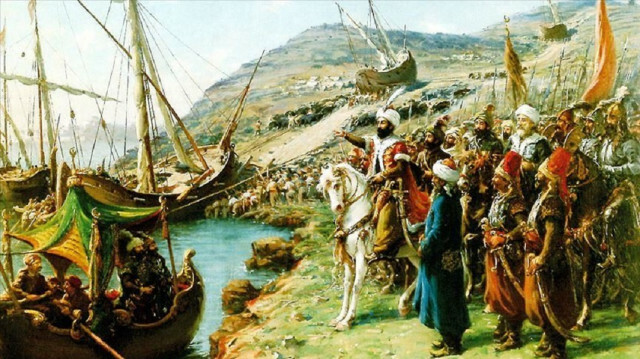
August is hailed as “the month of victory” in Turkey, as Turkish and Ottoman armies over the centuries won numerous wars in the month, changing the course of history.
For instance, “the great conquer of Belgrade” on Aug. 28-29, 1521 by Ottoman armies that led personally by Sultan Suleyman the Magnificent opened the gates of Central Europe to Ottoman Empire, whose European territories by then was limited to the Balkan Peninsula.
The Ottoman victory in Belgrade paved the way to another August victory five year later, again under the command of Suleyman, on Aug. 29, 1526. An Ottoman army decisively won the Battle of Mohacs against the Hungarian Kingdom. The victory that marked the end of Medieval Ages in Hungary also made the Ottoman Empire an influential European power.
Victories in the Battle of Otlukbeli on Aug. 11, 1473; Battle of Chaldiran against Safavid Empire on Aug. 23, 1514; and Battle of Marj Dabiq against Mamluk Sultanate on Aug. 24, 1516 secured the Ottoman dominance in eastern Anatolia and northern Mesopotamia, Levant and Palestine.
Ilber Ortayli, a well-known Turkish historian of Ottoman studies, underlines that Ottomans’ August victories are barely a coincidence. He maintains that armies in the Ottoman classical age generally started their march for annual military expedition in April when the weather conditions got milder after the winter and reached the Central Europe during August.
Among all these victories, two of them particularly stand out. The first is the Battle of Manzikert which was fought between Byzantine army, led by Emperor Romanos IV, and Seljuk Turk army, led by Sultan Alp Arslan, also known by his real name Muhammed bin Davud Cagri, on Aug. 26, 1071. The battle saw Selcuk Turks defeat a Byzantine army and open up Anatolia for Turkish domination.
By the early 12th century, Turkish tribes spread to all parts of the Anatolia, in both south-north and east-west axis. Even, crusades, between 1095 and 1291, and Mongol invasions in the 13th century could not displace Turks from their new homeland, Anatolia.
It is noteworthy that though various Turkic tribes – including Pechenegs and Kumans – moved to Anatolia before 1071, it was the first time after this victory, Turks established independent states, which allowed them to preserve their ethnic and religious identities and consequently dominate many parts of Eurasian continent.
The second one is the Battle of Dumlupinar, also known as the Field Battle of the Commander-in-Chief, which was fought between Turkish forces, led by Mustafa Kemal Ataturk, the founder of modern Turkey, and invading Greek forces, led by Georgios Hatzianestis on Aug. 26, 1922 in western Turkey.
Lutfi Mufit Ozdes, one of the close confidants of Ataturk, said that Aug. 26 was knowingly chosen by the commander-in-chief of the Turkish forces, who was inspired by Sultan Alp Arslan and wanted to gift the Turkish history a new Victory of Manzikert.
Turkish army, inferior to Greek army in terms of number of troops and arms, struck the enemy swiftly and decisively by Aug. 30 along the frontline. Only two weeks after the first guns were fired by Turkish artillery, the fifth Turkish Cavalry Corps commanded by Fahrettin Altay reach Izmir liberating all Turkish town, cities under Greek occupation.
The Turkish victory marked the end of the three-year-long Greek occupation in Western Anatolia.
The victory also made possible the establishment of the Republic of Turkey. The Turkish victory over Western imperialism inspired many nations, living under imperialist yoke, to dream and eventually fight for their self-determination.













